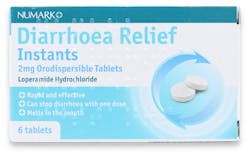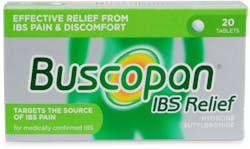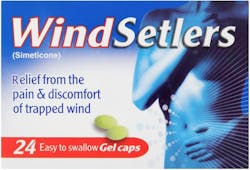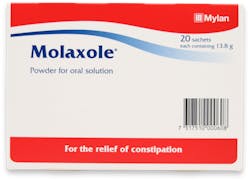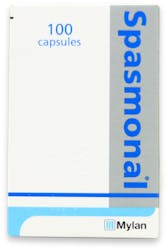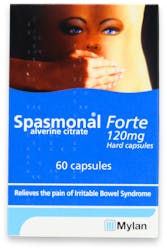IBS Treatment
IBS tablets and other forms of bloating relief can bring you comfort when symptoms of the conditions strike. We stock a range of solutions to help when you’re not feeling your best.
More about ibs, bloating & cramps
What are the best forms of relief for IBS and bloating?
Tablets and capsules
We have a range of different capsules and tablets for IBS and bloating, designed to help relieve any symptoms you may have. Each of them works slightly differently, depending on the symptom you’re treating. For example, if you’re looking for IBS diarrhoea relief, you might consider taking a probiotic tablet or a tablet that breaks down lactose, if that’s what causes your IBS and bloating. We also stock tablets that are specifically designed to ease cramping.
Sachets
If you struggle to take tablets, there’s a solution to bring you IBS flare up relief. We have a range of probiotic and prebiotic sachets that contain powder that can be mixed into water or sprinkled over food. Prebiotics feed the good bacteria in your gut, and probiotics add more of the good bacteria.
Liquid solutions
Besides tablets and sachets, we also have liquid solutions that can help with IBS symptoms. Aloe vera juice, for example, has widely been shown to benefit IBS and other digestive problems. A product like Floradix IntestCare has a liquid herbal formula that supports digestion and contributes to normal muscle function and electrolyte balance. We also stock other liquid solutions that relieve indigestion, wind and stomach discomfort. If you’re unsure which product is right for you and your symptoms, chat to our pharmacist who’ll be happy to help with expert advice.
What are the best brands for IBS relief?
Buscopan
Buscopan has been around for quite a while. 60 years, in fact. Buscopan IBS Relief tablets have been specifically created to help relieve pain caused by IBS. It has an antispasmodic action that directly targets muscle spasms in the bowel to relieve painful cramps and discomfort. It starts working in just 15 minutes and can be used at the first signs of a flare-up.
Buscopan Cramps is another tablet that helps to relieve cramping and pain caused by IBS. Rather than just numbing the pain caused by cramps, it works at the source. As it moves down your digestive tract, it interrupts the signals that tell your gastrointestinal muscles to cramp.
OptiBac
Many clinical trials have shown that taking specific probiotics can support the health of people who suffer from IBS. This is where OptiBac can help. Some of their products, like OptiBac Bifidobacteria & Fibre, containing bifidobacterium Lactis BB-12, and OptiBac Probiotics for Every Day capsules with lactobacillus acidophilus NCFM and bifidobacterium lactis Bi-07 may help certain types of IBS.
DulcoEase
One of the common symptoms of IBS can be constipation. Thankfully, DulcoEase can provide softening relief when going to the toilet is painful or difficult. It works by helping dry, hard stools soak up natural fluid.
Lamberts
If you suffer from IBS and bloating you’ll know there are a range of things that can trigger a flare up or make symptoms worse. One of these could be an intolerance to lactose. But you may still really enjoy the occasional milkshake or pizza. Lamberts offers a great solution with their Lactase Complex. Lactase is a digestive enzyme that’s required to break down sugar milk lactose. It’s usually produced in the small intestine but, in cases where the production is impaired, undigested lactose will move into the colon. When this happens, hydrogen, carbon dioxide and organic acids are produced, which can cause cramping, wind and diarrhoea.
What supplements help with IBS?
If you have IBS, over the counter supplements and a healthy diet could help with some of the symptoms. Taking a fibre supplement may help if your IBS causes constipation and you’re not getting enough of it in your diet. If you do decide to take these, be sure to drink plenty of water with them. Probiotic supplements that add good bacteria to your gut may ease tummy pain and wind caused by IBS, and prebiotics may also help, although more research is needed in this area. Peppermint oil may also help by easing pain caused by inflammation. If you’re thinking about taking a supplement, but don’t know if you should, or which one would be good for your IBS symptoms, get in touch with our pharmacist who’ll be able to give you expert guidance.
How to prevent IBS
IBS is different for everyone. Understanding the triggers that cause your fare ups means you’ll be able to avoid them. Here are a few of the more common triggers:
Diet and constipation
Some foods can make IBS-related constipation worse, such as white bread and refined grains, processed foods, coffee, alcohol, fizzy drinks, high protein diets and dairy.
Diet and diarrhoea
Too much fibre can cause diarrhoea. Also, fizzy drinks, large meals, fried and fatty foods, dairy and more can cause flare-ups.
Stress and anxiety
Unsurprisingly, these can make your symptoms worse too.
Certain medications
Let your doctor or one of our pharmacists know about your IBS before taking medications. They’ll be able to advise if the specific medication could make your symptoms worse.
Periods
People who have periods may notice their IBS symptoms get worse during this time.








